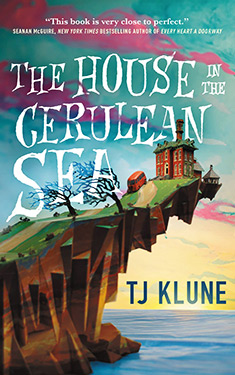T. J. Klune
Completed 2/14/2022, Reviewed 2/15/2022
5 stars
This book was beautiful. It’s not necessarily a YA novel, but it involves children and the tone is very gentle. It’s about magical children being stripped from their families or taken from the streets and put in schools to assimilate them with the rest of society. If that sounds familiar, it’s because it was inspired by the similarly horrific tragedy of the indigenous children of Canada. The book has been criticized by some as cultural appropriation for the setup. But in and of itself, the book is beautifully written with heartwarming and -wrenching events and includes hope for a better future and a wonderfully gentle gay romantic subplot. It made me leak tears. This book won the 2021 Mythopoeic Award last year.
The story begins with Linus, an overworked, fastidious, single-minded social worker for the Department in Charge of Magical Youth (DICOMY). He goes to the “schools” where the magical children are forced to go and make sure everything is in order. If not, he closes them down. Because of his objectivity and detail, he is assigned to a special school out on an island off the coast to determine if it should be closed. The children are extreme cases and the headmaster has a non-traditional approach. Linus goes for a month and meets the six children, a bearded gnome girl, a wood sprite, a wyvern, a shapeshifter, a blob with tentacles and eye-stalks, and the antichrist. There is also an island sprite who helps the headmaster, Arthur. Of course, over the stay, Linus softens, not only caring for the children and appreciating Arthur’s handling, but also realizing the evil that DICOMY perpetuates.
The story is told from Linus’ point of view. It starts in the stark, grey, rainy world of the city and he’s investigating a disturbance by a child in one of the schools. That is his world: dull, matter of fact, orderly, and severe. He’s lived this way for 17 years, never taking a vacation, and almost never getting any demerits. But then he transforms when he gets to the island. The great thing about it is that it is slow and realistic. He doesn’t just one day change. He goes back and forth trying to live by the rules and regulations of DICOMY and trying to be a human being. The other characters who work at DICOMY are just as severe. His boss, more so. They are caricatures of everything that’s wrong with government agencies chained to rules and regulations.
On the other hand, Arthur and the magical children are more human than the “normal” humans. Though the children are tough to get to know because of the trauma and the abuse they’ve been through, they are just children, with all the chaos that comes with being a child. Linus unwittingly comes to crack through their rough exteriors, possibly losing his “objectivity”, but making him slightly more human.
Unlike many of the Mythopoeic Award winners, this book is less prosy and more on convincing dialogue. The world building comes through in the conversations as well as the slow internal paradigm shift Linus experiences. Still, reading it was a pleasure, full of great word choices and sentences without being flowery or pretentious.
I give this book five stars out of five because the end made my gut wrench and then my eyes water. It’s very sweet without being saccharine. Even the romance between Arthur and Linus is tender and gentle, though awkward through most of it. Klune writes positive queer characters and relationships, something he believes is important to do, now more than ever. I can’t wait to read his new book, which was a deal of the day, and go back over his early works as well. He’s an author I’m definitely going to try read more of.

No comments:
Post a Comment